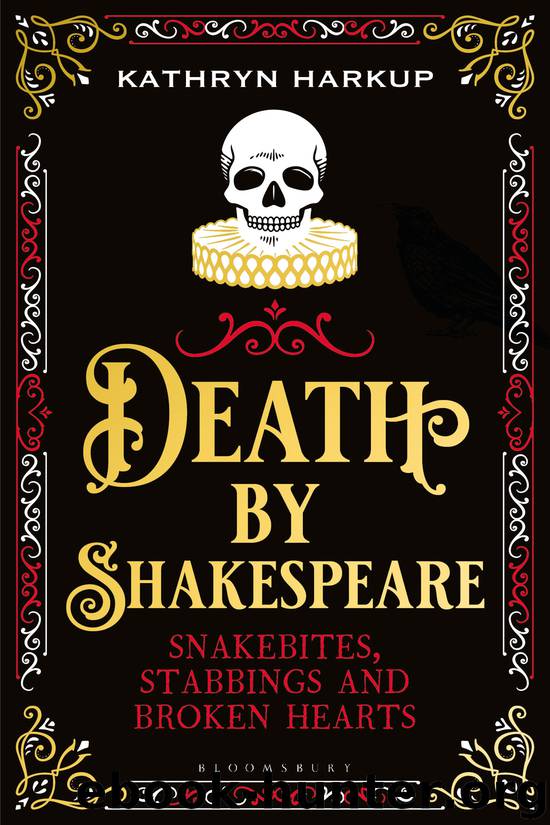Death by Shakespeare by Kathryn Harkup

Author:Kathryn Harkup
Language: eng
Format: epub
Publisher: Bloomsbury Publishing
CHAPTER SEVEN
A Plague O’both Your Houses!
How foul it is; what rank diseases grow
Henry IV Part ii, Act 3, Scene 1
Disease is ever present in our world, but in Shakespeare’s time, malnutrition, poor sanitation and ineffective remedies all contributed to much higher death rates. Personal health was understandably something of a preoccupation for Elizabethans and Shakespeare seems to have been more preoccupied than his fellow playwrights. Disease, in some form or other, is mentioned in every Shakespeare play. Mostly it is casual asides, incidental dialogue or a minor event on the sidelines of the main action of the play. A large proportion of Shakespeare’s huge stock of insults are disease-based. If a character disliked someone they might literally wish them ill – ‘make him / By inchmeal a disease!’ (The Tempest). In cases of real hatred, particularly nasty diseases might be selected for an especially malicious curse – ‘Boils and plagues / Plaster you o’er, that you may be abhorr’d / Further than seen’ (Coriolanus). But in several plays the role of disease is much more developed.
* * *
The diseases that people in Renaissance England lived and died with were very different from those that worry us today. Bacterial infections such as typhoid, syphilis and scarlet fever, that once killed millions, have been brought under control by the discovery of antibiotics in the twentieth century. Viral infections, such as measles and smallpox, which destroyed countless lives, have been tamed or eliminated completely by vaccinations.
In Shakespeare’s day, old familiar diseases, such as tuberculosis, influenza and leprosy, fought for victims alongside virulent newcomers such as syphilis and typhus. It was a crowded and competitive field and not all infectious agents survived. New diseases generally outcompeted old diseases for victims.
The ‘English Sweating Sickness’, for example, was only a temporary visitor. It appeared in 1485 without explanation and disappeared just as mysteriously in 1551. Cases were confined to England and English-held regions of France; even foreigners living in these areas appear to have been completely unaffected. The symptoms of high fever and profuse sweating appeared overnight or in the morning and continued for 24 hours, after which patients were either on their way to recovery or dead. Mortality rates were around 30 per cent. For reasons unknown, sweating sickness caused particularly high mortality among the upper classes and therefore there was a lot of fuss made about it at the time. In Measure for Measure Mistress Overdone, a brothel owner, complains that the sweat, among many other causes of death, is having a detrimental effect on her business: ‘Thus, what with the war, what with the sweat, what with the gallows and what with poverty, I am custom-shrunk.’ The fact that the play was written in 1604, long after the disease had disappeared, and is set in Vienna, where the disease never occurred, shows how much impact it had made on the public consciousness. Though many theories have been put forward, including scarlet fever, influenza and hantaviruses, there is no completely satisfactory explanation of the disease.
Download
This site does not store any files on its server. We only index and link to content provided by other sites. Please contact the content providers to delete copyright contents if any and email us, we'll remove relevant links or contents immediately.
| Books & Reading | Comparative Literature |
| Criticism & Theory | Genres & Styles |
| Movements & Periods | Reference |
| Regional & Cultural | Women Authors |
4 3 2 1: A Novel by Paul Auster(12395)
The handmaid's tale by Margaret Atwood(7769)
Giovanni's Room by James Baldwin(7348)
Big Magic: Creative Living Beyond Fear by Elizabeth Gilbert(5778)
Asking the Right Questions: A Guide to Critical Thinking by M. Neil Browne & Stuart M. Keeley(5778)
Ego Is the Enemy by Ryan Holiday(5452)
The Body: A Guide for Occupants by Bill Bryson(5099)
On Writing A Memoir of the Craft by Stephen King(4947)
Ken Follett - World without end by Ken Follett(4737)
Adulting by Kelly Williams Brown(4578)
Bluets by Maggie Nelson(4559)
Eat That Frog! by Brian Tracy(4543)
Guilty Pleasures by Laurell K Hamilton(4451)
The Poetry of Pablo Neruda by Pablo Neruda(4112)
Alive: The Story of the Andes Survivors by Piers Paul Read(4034)
White Noise - A Novel by Don DeLillo(4012)
Fingerprints of the Gods by Graham Hancock(4005)
The Book of Joy by Dalai Lama(3988)
The Bookshop by Penelope Fitzgerald(3854)
